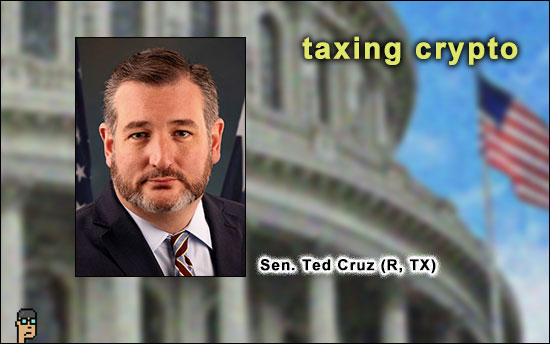On Wednesday, Senator Ted Cruz (R, TX) re-introduced his efforts which began way back in 2021 to remove egregious taxation requirements of the Infrastructure Investment and Jobs Act of 2021 on crypto companies.
At the time, Cruz’s press release noted today’s recurring concerns about the potential for innovation moving overseas: “Let’s not be the number one economic developer for the Communist Party of China by sending cryptocurrencies overseas.”
Cruz’s 2023 version, which has been referred to Senate Finance, is known in Senate records as S.695 (see it) or “A bill to repeal the provisions of the Infrastructure Investment and Jobs Act that impose new information reporting requirements with respect to digital asset transfers.” No co-sponsors are currently listed. The bill is here (PDF).
Cruz has been signaling his interest lately about wanting a seat at the table of blockchain legislation. (Read the Houston Chronicle: “Ted Cruz is one of crypto’s true believers, even as calls for regulation grow.”)
The timing of the re-introduction coincides with the re-introduction of the McHenry-Torres bill “Keep Innovation in America Act” on Tuesday. The House version was also introduced in 2021 in the 117th Congress with McHenry teaming with former Rep. Tim Ryan (D, OH) and, at the time, included a bipartisan letter to U.S. Treasury Secretary Janet Yellen (see letter and release).
Sen. Cruz was not part of last year’s bipartisan bill in the Senate which looked to make similar crypto tax revisions coming out of passage of the Jobs Act and included Senators Mark Warner (D, VA), Pat Toomey (R, PA), Cynthia Lummis (R, WY), Kyrsten Sinema (I, AZ), and Sen. Rob Portman (R, OH). Read that press release from last August.
Cruz would be an interesting choice by pro-crypto proponents in Congress who are aware of the potential for a divided Congress to trip up any legislation perceived as partisan. Cruz’s past partnership with members across the aisle appears to be limited. Nevertheless, at Senator Cruz’s back is the state of Texas and its large blockchain constituency.

